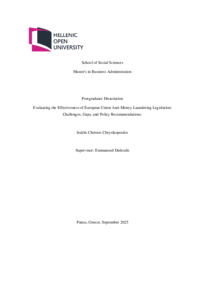- MSc thesis
- Διοίκηση Επιχειρήσεων (MBA)
- 24 Σεπτεμβρίου 2025
- Αγγλικά
- 83
- Dedoulis Emmanouil
- AMLA, Money laundering, EU Anti-money Laundering Directives, Danske & Deutsche Bank
- MBA DISSERTATION
- 78
-
-
Although money laundering is not a new economic phenomenon, it only began to concern
modern states during the last quarter of the 20th century. In their efforts to combat it,
relevant authorities established legislation and created agencies to address the issue. This
thesis examines the phenomenon of money laundering and its impact on the real economy
within the context of the European Union. Specifically, it will study and evaluate the
legislation enacted and the actions taken by European authorities to combat the
phenomenon, as well as assess their effectiveness. The regulatory framework and its
shortcomings will be investigated, while in order to gain a deeper understanding of the
issue,two case studies related to the infiltration of money laundering and its consequences
in the banking sector will be analyzed. The banking sector, as the bastion of the financial
system and, consequently, of the entire economic system, will serve as a reference point
for the implementation of anti-money laundering policies and for the weaknesses that
exist, which provide fertile ground for the perpetuation of the phenomenon. In conclusion,
legislative gaps within the European Union will be identified, along with proposals to
improve countermeasures to restore economic stability and balance
-
- Hellenic Open University
- Items in Apothesis are protected by copyright, with all rights reserved, unless otherwise indicated.
Evaluating the Effectiveness of European Union Anti-Money Laundering Legislation: Challenges, Gaps, and Policy Recommendations
Κύρια Αρχεία Διατριβής
 IRAKLIS CHRYSIKOPOULOS MBA DISSERTATION
IRAKLIS CHRYSIKOPOULOS MBA DISSERTATION
Περιγραφή: I.C-CHRYSIKOPOULOS MBA DISSERTATION.pdf (pdf) Book Reader
Μέγεθος: 1.0 MB

